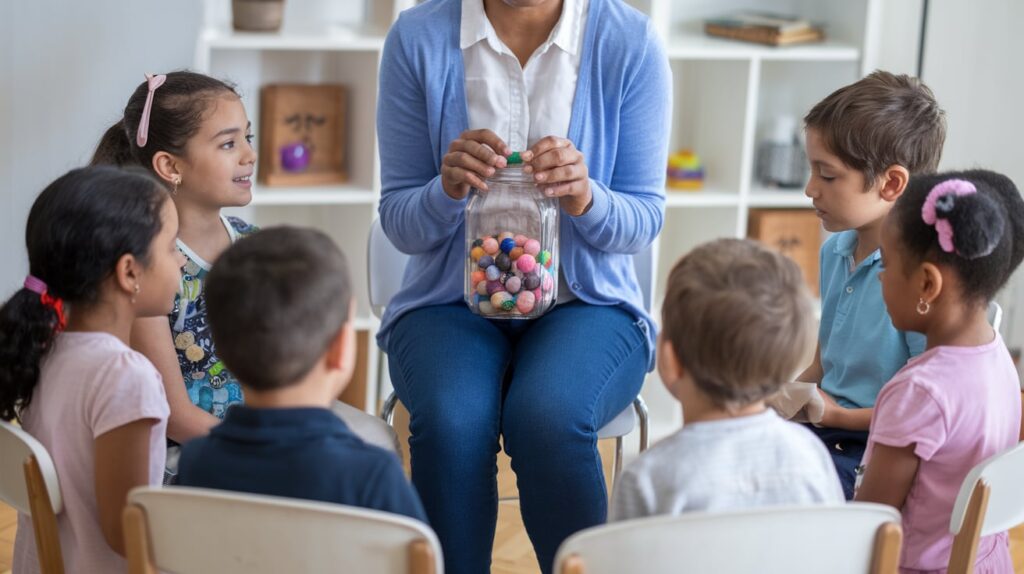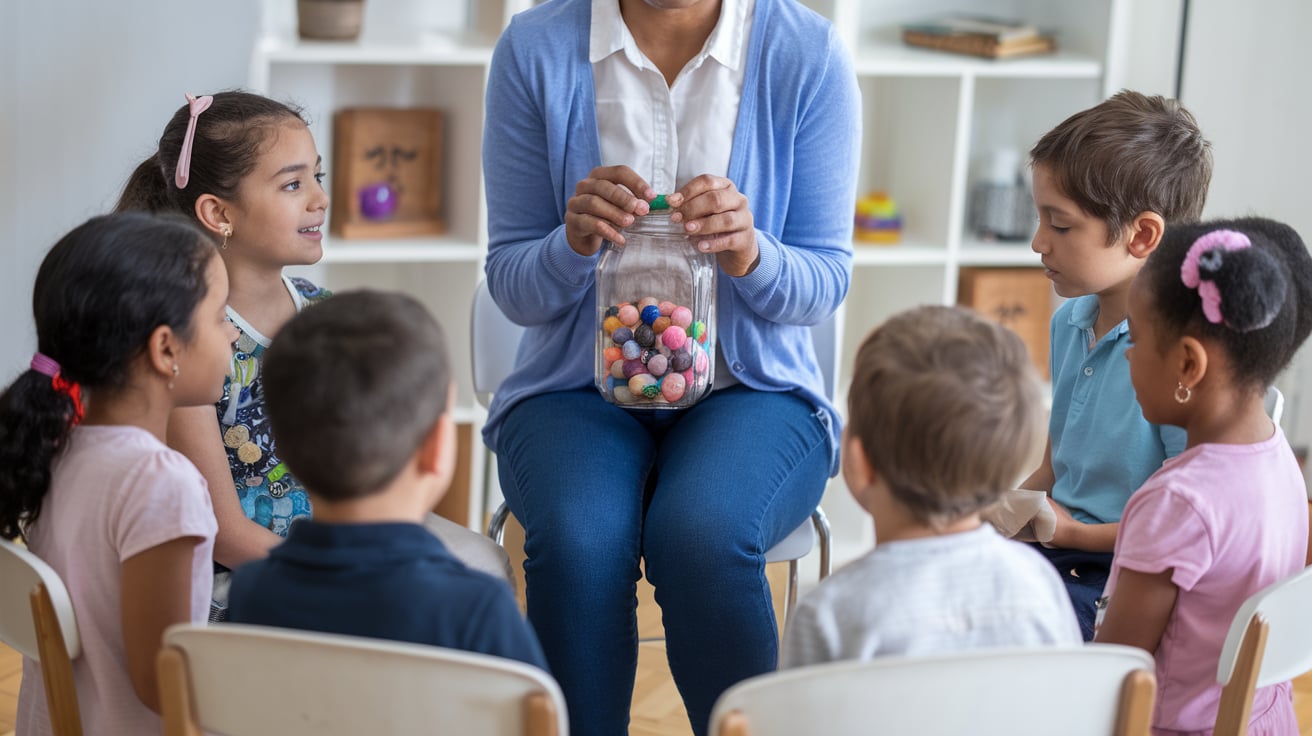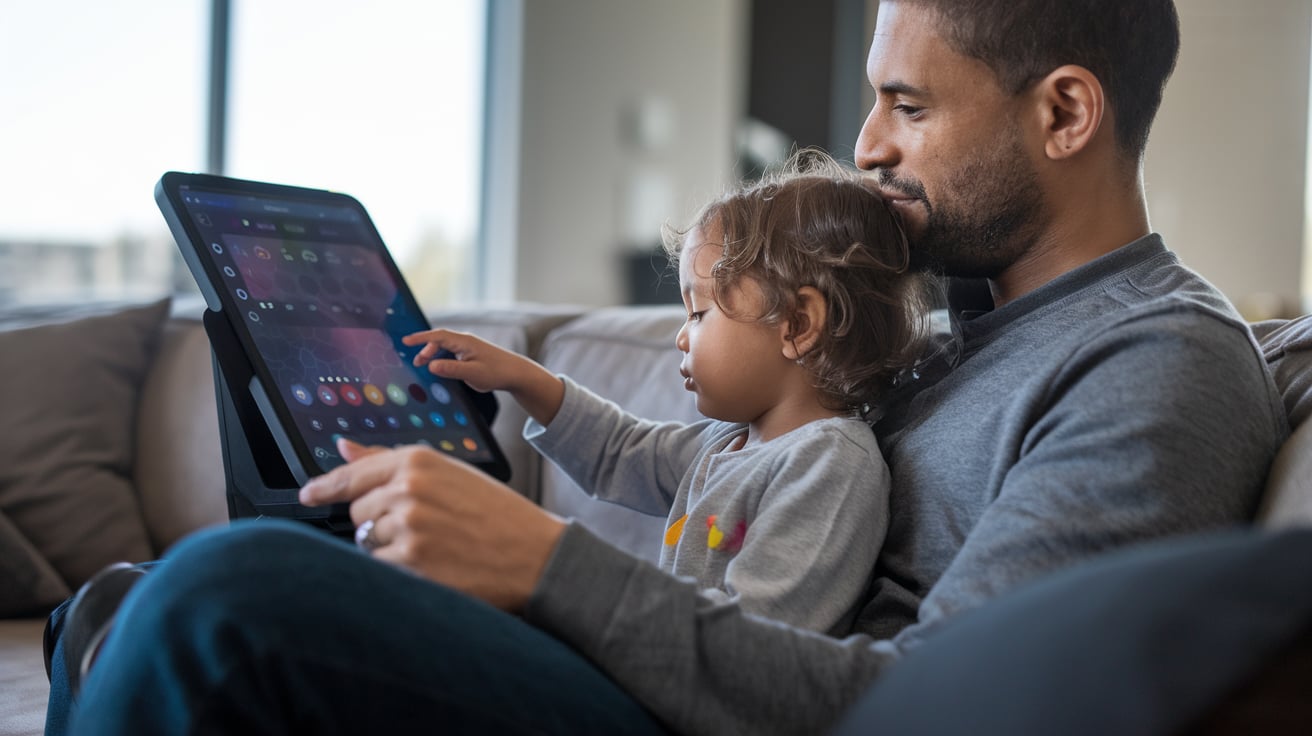
Helping Kids Overcome Over-dependence on Parents
As parents, we want our kids to grow up independent, resilient, and self-assured. But sometimes, our desire to protect them can lead to over-dependence. This is known as “helicopter parenting.” This article will explore the risks of this approach and share ways to help kids become more self-reliant.
When kids rely too much on their parents, it can harm their emotional health and decision-making skills. It also makes them less ready for the real world. By spotting the signs of too much parental involvement, we can help our children grow into confident, self-sufficient adults.
Key Takeaways
- Recognise the importance of fostering independence in children from an early age
- Establish healthy boundaries and age-appropriate expectations to promote autonomy
- Encourage problem-solving skills and decision-making to build resilience
- Address emotional enmeshment and promote healthy separation between parents and children
- Involve children in age-appropriate choices to nurture their decision-making abilities
Understanding the Dangers of Over-dependence
It’s natural for parents to want to support their kids. But, relying too much on parents can harm a child’s growth. It’s key to know the risks to help kids grow up right.
Recognising the Signs of Parental Over-involvement
Signs of too much parent involvement include constant watching and not letting kids decide for themselves. It also means solving their problems instead of teaching them how. This can stop kids from growing up independent and learning important life skills.
Potential Long-term Impacts on Child Development
Being too dependent on parents can affect a child’s feelings, choices, and growing up. Kids might struggle to be on their own, feel too close to their parents, and have trouble setting boundaries. This can make it hard for them to form good relationships and grow up.
- Inability to make decisions independently
- Difficulty problem-solving and managing stress
- Increased risk of anxiety and depression
- Challenges in forming healthy peer relationships
- Delayed development of essential life skills
By spotting these issues early and working on over-dependence on parents for kids, parents can help their children become independent and strong. This is important for their future success.
Helping Kids Overcome Over-dependence on Parents
| Characteristic | Healthy Parenting | Over-involvement |
|---|---|---|
| Autonomy | Encouraging independence | Limiting child’s decision-making |
| Problem-solving | Guiding the process | Solving problems for the child |
| Emotional Support | Providing a secure base | Emotional enmeshment |
| Boundaries | Establishing healthy limits | Blurred boundaries |
“Fostering independence and resilience in children is crucial for their long-term success and well-being.”
Fostering Independence at an Early Age
Teaching kids to be independent early on is key for their growth. By slowly teaching them to solve problems and make their own choices, parents help them grow strong. This builds a foundation for a lifetime of self-confidence and resilience.
One great way to start is by letting kids do things on their own. Like getting dressed, packing their bags, or helping with small chores. It boosts their self-reliance and makes them feel proud and capable.
Parents can also let kids make some choices, like what to wear or what to do on outings. This lets them take charge and learn to solve problems.
By giving kids more independence and responsibility, parents help them grow into confident, self-sufficient people. This prepares them to face life’s challenges head-on.
Setting Healthy Boundaries and Limits
As parents, setting healthy boundaries and limits is key. These boundaries teach children respect and personal responsibility. They also help with their emotional wellbeing in the long run.
Establishing Age-appropriate Expectations
It’s vital to set expectations that match a child’s age. This ensures the boundaries you set are right for them. It helps them feel secure and builds their independence and decision-making skills.
The Importance of Consistent Parenting
Consistency in parenting is crucial for healthy boundaries and limits. Children do best when rules and consequences are clear and fair. This teaches them to respect boundaries and prevents emotional enmeshment with parents.
By setting these boundaries, parents help their children become more self-reliant and emotionally strong. This prepares them for a future where they can confidently navigate the world on their own.
Building Resilience and Self-reliance
It’s key to help kids become resilient and self-reliant. This helps them succeed and stay happy in the long run. By teaching them to solve problems, we give them the power to face challenges alone. This builds their confidence to deal with life’s hurdles.
Helping Kids Overcome Over-dependence on Parents
Encouraging Problem-solving Skills
We should let kids find their own ways to solve problems. This boosts their self-reliance and teaches them valuable problem-solving skills. These skills are essential for their future.
Ask open-ended questions to get kids thinking deeply. Ask them how they’d tackle a problem or what steps they’d take to achieve something. Letting them try and learn from mistakes helps build resilience and a growth mindset.
- Encourage children to identify the problem and brainstorm potential solutions.
- Resist the urge to immediately provide the answer; instead, guide them through the problem-solving process.
- Celebrate their efforts and progress, regardless of the outcome, to reinforce the value of their autonomy development.
The journey of self-discovery is more important than the end result. By creating a supportive space for kids to explore and learn, we help them grow. This way, we nurture the building resilience and self-reliance they need to succeed.
TO WATCH VIDEO CLICK HERE
| Skill | Description | Benefits |
|---|---|---|
| Problem-solving | The ability to identify and address challenges independently. | Develops critical thinking, decision-making, and self-reliance. |
| Resilience | The capacity to bounce back from setbacks and adapt to change. | Fosters emotional well-being, perseverance, and a growth mindset. |
| Autonomy | The freedom to make decisions and take responsibility for one’s actions. | Promotes self-confidence, independence, and building resilience. |
Overcoming Emotional Enmeshment
As parents, setting healthy emotional boundaries with our kids is key. But, it’s a fine line. Emotional enmeshment, where parents and kids are too close, can harm a child’s growth.
Spotting emotional enmeshment is the first step to raising a strong, independent child. Signs include being too protective, invading privacy, or struggling to let go as kids get older.
To break free from this, parents must teach emotional independence and set clear boundaries. This means encouraging kids to solve problems on their own, making their own choices, and facing the results of their actions.
Strategies for Establishing Healthy Boundaries
- Let your child share their thoughts and feelings without rushing to fix things.
- Respect their need for alone time and privacy, and don’t get too involved in their daily life.
- Start giving them more say in decisions, beginning with small choices.
- Show them how to manage emotions and be independent by being a good role model.
- Get help from teachers or counsellors to build a strong support network for your child.
By setting these boundaries, parents can help their kids grow into confident, self-sufficient adults. It’s a journey, but it’s crucial for raising well-rounded, confident kids.
Helping Kids Overcome Over-dependence on Parents
Over-dependence on Parents for Kids
As kids grow, they naturally look to their parents for help and advice. But too much reliance can hold them back. It can lead to social, emotional, and academic problems. It’s important to know how too much parental involvement can affect kids.
Too much dependence can stop kids from becoming independent. They might not learn to think for themselves or solve problems. This makes it hard for them to grow up and live on their own.
- Difficulty making decisions on their own
- Inability to solve problems without parental assistance
- Lack of confidence in their own abilities
- Struggles with time management and organisational skills
Also, too much reliance on parents can hurt a child’s social skills. Kids who are too protected may find it hard to make friends. They might not know how to handle social situations on their own.
| Potential Consequences of Over-dependence | Impact on Child Development |
|---|---|
| Lack of independence | Difficulty in decision-making, problem-solving, and developing essential life skills |
| Social challenges | Difficulty forming meaningful relationships with peers, social isolation |
| Emotional difficulties | Increased anxiety, difficulty regulating emotions, and struggles with self-esteem |
| Academic underperformance | Decreased motivation, poor time management, and challenges in adapting to new educational environments |
It’s key for kids to break free from too much parental reliance. Parents can help by teaching kids to be self-reliant. This way, kids can grow into confident, independent adults.
Promoting Autonomy and Decision-making
As parents, we have a big role in helping our kids grow up to be independent. By letting them make choices, we help them feel more in control. This way, they become confident and ready to face the world on their own.
This method not only helps with autonomy but also teaches them to rely on themselves. It’s a great way to raise kids who can make their own decisions.
Involving Children in Age-appropriate Choices
Letting kids make choices, even small ones, is very important. It could be picking their clothes or what to do on the weekend. This helps them feel like they own their decisions and teaches them to be responsible.
It also helps them learn to solve problems and think critically. They start to understand how their choices affect others.
- Offer choices within reasonable limits, ensuring the options are appropriate for their age and maturity level.
- Encourage children to express their preferences and opinions, validating their input and involving them in the decision-making process.
- Gradually increase the complexity of the choices as children grow, allowing them to take on more responsibility and independence.
It’s important to find a balance. We should guide them but also let them make their own decisions. This way, they become confident and ready for life’s challenges.
Addressing Helicopter Parenting Tendencies
It’s natural for parents to want to protect and guide their kids. But when this desire gets too much, it can turn into “helicopter parenting.” This style of parenting means parents are always watching over their kids, which can harm their growth and independence.
Spotting the signs of helicopter parenting is key. If parents always step in, stop their kids from taking risks, or handle their school and social life, they might be helicopter parents.
This kind of over-involvement can really hold kids back. It stops them from learning to solve problems, be resilient, and be independent. Parents need to learn to give their kids space to handle things on their own. This means guiding them when needed, but not doing everything for them.
Cultivating a Balanced Approach
Finding the right balance between being involved and giving kids space is important. Here are some ways to tackle helicopter parenting:
- Let your child make decisions and take on tasks that fit their age and abilities.
- Help your child learn to solve problems by guiding them, not doing it for them.
- Don’t jump in right away when your child faces a problem. Let them figure it out.
- Talk to your child about why independence is important and how it will help them in the future.
By tackling helicopter parenting and finding a balanced way to raise kids, parents can help their children grow strong and ready for the future.
Strategies for Child-rearing Without Over-involvement
Finding the right balance in child-rearing is key. It helps kids become self-reliant and resilient. It’s important to support them but also not to overstep. This way, kids learn to set their own boundaries and stay well-adjusted.
Finding the Right Balance
Here are some tips for parents to find that balance:
- Let kids make choices within their age limits. As they grow, give them more freedom.
- Teach them to solve problems on their own. Guide them when they need it.
- Set clear rules and stick to them. This gives kids a sense of security and order.
- Focus on their efforts, not just the results. This boosts their confidence and resilience.
- Give them small tasks to do. This helps them feel useful and builds their self-esteem.
By following these tips, parents can help their kids grow into independent, confident people.
| Over-involvement | Balanced Approach |
|---|---|
| Too much control and decision-making | Let kids make choices within their age range |
| Always solving their problems | Teach them to find their own solutions |
| Rules that change too often | Clear and consistent rules |
| Only praising the end result | Encourage effort and progress |
| Not giving them a chance to contribute | Involve them in household tasks |
“The goal of parenting is not to create dependent children, but to raise self-reliant, resilient individuals who can navigate the world on their own.” – Dr. Alison Gopnik, developmental psychologist
The Role of Positive Reinforcement
As parents, we have a powerful tool to help our kids grow independent and self-reliant. Positive reinforcement is key. By celebrating their achievements, big or small, we boost their confidence and resilience. This empowers them to face new challenges with confidence and self-assurance.
When we praise our child’s efforts and growth, it makes a big difference. It encourages them to keep striving for the best. It also builds their self-belief, which is vital for them to become self-reliant.
It’s also important to let kids make their own decisions, within reason. By doing this, we help them develop resilience and independence. This way, they learn to think for themselves and make their own choices, supporting their growth.
Helping Kids Overcome Over-dependence on Parents
FAQ
What are the dangers of over-dependence on parents for kids?
Kids who rely too much on parents might struggle to grow up. They may find it hard to make decisions on their own. This can affect their ability to form good relationships and deal with challenges.
How can parents foster independence at an early age?
Parents can start by teaching kids to do things for themselves. Encourage them to solve problems and make choices. This builds confidence and prepares them for life.
What is the importance of setting healthy boundaries and limits?
Setting clear boundaries helps kids grow up right. It teaches them to respect rules and take responsibility. This is key for their development.
How can parents build resilience and self-reliance in their children?
Parents can help by letting kids face small challenges. Encourage them to solve problems on their own. A supportive environment helps them learn from mistakes.
What is emotional enmeshment, and how can it be overcome?
Emotional enmeshment happens when parents and kids are too close. Parents need to set boundaries and encourage kids to be independent. This helps the family feel more balanced.
How can parents promote autonomy and decision-making in their children?
Parents can give kids choices and let them take responsibility. This helps them learn to make decisions and solve problems. It builds their confidence.
How can parents address helicopter parenting tendencies?
Parents should step back and let kids grow on their own. Recognising helicopter parenting is the first step. Then, give kids space to develop.
What strategies can parents use for child-rearing without over-involvement?
Parents can find a balance between supporting and letting kids be independent. Encourage self-reliance and resilience. Healthy boundaries are also key.
How can positive reinforcement support children’s independence and self-reliance?
Positive feedback, like praise and encouragement, boosts kids’ confidence. It helps them feel proud of their achievements. This supports their growth into independent individuals.
Helping Kids Overcome Over-dependence on Parents
TO SEE MORE TOPICS CLICK HERE


